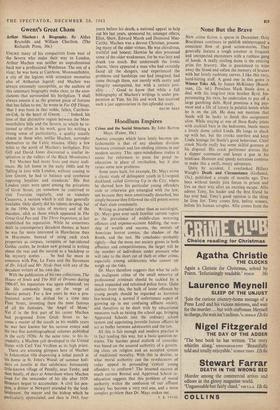Gwent's Great Cham
UNLIKE many of his compatriots from west of the Severn who make their way to London, Arthur Machen was neither an unprofessional bard nor a professional Welshman. The son of a vicar, he was born at Caerleon, Monmouthshire, a city of the legions with attendant memories also of Arthurian legend; and Machen was always extremely susceptible, as the authors of this centenary biography make clear, to the asso-
ciations that surrounded his birthplace. 'I shall always esteem it as the greatest piece of fortune
that has fallen to me,' he wrote in Far 011 Things,
'that 1 was born in that noble, fallen, Caerleon- on-Usk, in the heart of Gwent. • . .' Indeed, his love of that distinctive region between the Mon- mouthshire hills and the Severn, to which he re-
turned so often in his work, gave his writing a strong sense of particularity, a quality usually absent in those who, unlike Machen, surrender themselves to the Celtic miasma. (Only a few miles to the north of Machen's birthplace, Eric Gill and David Jones discovered a similar in- spiration in the valleys of the Black Mountains.) Yet Machen had many lives and many audi- ences. He left home in the early 1880s and by `falling in love with London, without ceasing to love Gwent, he had to balance and synthesise Opposing loyalties and standards.' His first London years were spent among the privations of Grub Street, yet somehow he contrived to visit Touraine regularly, and to translate Casanova, a version which is still that generally available. Only slowly did his talents develop, but in the 1890s his tales of mystery and of the Macabre, stich as those which appeared in The Great God Pan and The Three Impostors, at last established his reputation. While he sometimes dealt in contemporary decadent themes, at heart he was far more interested in Hawthorne than in Huysmans. Instead of using such stock properties as corpses, vampires or bat-infested Gothic castles, he broken new ground in writing about the real and the natural as a backdrop to his mystery stories . . . `he had far more in common. with Poe, Le Fanu and the Stevenson of Dr. Jekyll and Mr. Hyde than with any of the decadent writers of his own day.'
With the publication of his two collections, The House of Souls and The Hill of Dreams during 1906-07, his reputation was again enhanced; yet his life constantly hung on the verge of chaotic penury. For a few years he was a pro- fessional actor; he drifted for a time into Fleet Street, inventing there the most famous of all his fantasies, 'the Angel of Mons.' Yet if in the first part of his career Machen had progressed from Grub Street to be- come a master of the occult, in his middle years he was best known for his serious essays and his two fine autobiographical volumes published in the early 1920s. At the same time, to his in- credulity, a Machen cult developed in the United States with Carl Van Vechten as its high priest.
There are amusing glimpses here of Machen in Johnsonian role dispensing a lethal punch at his home in St. John's Wood; of summer holi- days en famine at that salubrious, fortunately little-known village of Penally, near Tenby, and then finally, of days at Amersham where Machen lived for the remainder of his life after 1929. Honours began to accumulate. A civil list pen- sion, a dinner at Newport attended by the lord- lieutenant, the mayor and the bishop which he particularly appreciated, and then in 1943. four
years before his death, a national appeal to help out his last years, sponsored by, amongst others, Eliot, Shaw, Edward Marsh and Desmond Mac- Carthy. Machen was a devout Christian, possess- ing many of the older. virtues. He was chivalrous, truthful and honest; likewise he also possessed some of the older weaknesses, for he was lazy and drank too much. But underneath the ironic charm, 'there appeared a man who had certainly faced all the dangers, and experienced the problems and hardships one had imagined, had come through them, not merely with sanity and integrity unimpaired, but with a certain jovi- ality. . . .' Good to know that while a full bibliography of Machen's writings is under pre- paration at Yale, his life and work has received such a just appreciation in this splendid study.
DAVID REES






























 Previous page
Previous page